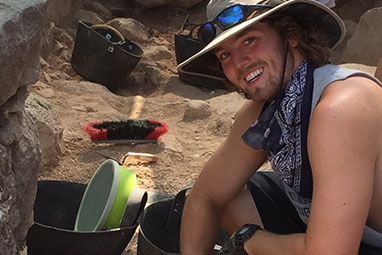SPARTANBURG, S.C. — Phifer Nicholson ’16, Wofford’s 2015-16 Presidential International Scholar, has landed back on campus to finish up his senior year. Last semester he spent a month in Istanbul, Turkey, three months in northern Israel and three weeks in Palestine studying how interpersonal interactions can subvert narratives that exist about “the other.”
“I’ve seen in my life personally, and the lives of others, that things like media and culture have a powerful sway on what we believe about other people,” he explains. “My interviews seem to indicate that authentic interaction can serve to change those things.”
Nicholson, a religion major with a minor in business, conducted ethnographic research with people of ethnic and religious minorities about experiences and relationships with majority groups. What he found were problems that were not foreign to him.
“There are deep-seated problems everywhere you go, and they are remarkably human problems,” he notes. “You hear some of the same rhetoric in Jordan about Syrian refugees that you hear from Donald Trump about Latin immigrants. ‘They won’t assimilate, they’re going to ruin our country… etc.’”
As his research showed him the congruity of social problems worldwide, he began to appreciate the sameness of humanity. While on a run near a refugee camp in Bethlehem, he encountered a group of children on the street. They noticed tear gas residue on his hands, and immediately dragged him to a faucet to wash it off. They knew if he touched his eyes with dirty hands, they would burn.
“I saw a beauty and a sameness in humanity in one of the places I least expected, in the form of boys with slingshots,” Nicholson says “I threw toilet paper at trees when I was growing up. They throw rocks at Israeli military.”
Now that he’s back and continuing work on his research, he is pondering a new question: What structures exist that keep interpersonal relations from happening – that could lead to positive perceptions of different ethnic and religious groups?
“In Israel you have language, culture and socioeconomic differences,” he says. “There is also an age discrepancy in higher education, because all Israelis serve in the military, and so they’re older when they start school.”
While in Israel last summer, Nicholson was among five Wofford students and an alumnus who, along with Dr. Byron McCane, the Albert C. Outler Professor of Religion, worked a dig at the Horvat Kur synagogue excavation site (dating back to the Byzantine period), located on a hilltop a few kilometers from the northwestern shore of the Sea of Galilee. They were in Israel as part of the Kinneret Regional Project, an international research consortium sponsored by Wofford College, University of Bern (Switzerland), University of Helsinki (Finland) and Leiden University (The Netherlands).
Coming back to Wofford after all his travels is like stepping into an old pair of shoes, but after all his experiences and research, some things have changed.
“I’m a very different person. I’m still Phifer, but an experience like this changes you,” he says. “First, you have a thesis about the world. Then you see an antitheses – something that contradicts that thesis. Finally, there’s a synthesis stage, when you have to reconcile your antitheses and form a new thesis. Right now I’m in the synthesis process.”
Nicholson, who is from Plymouth, Minn., plans on finishing his degree and graduating on time in May. However, he has developed a new passion for medicine as a means of fighting poverty.
“I’ve begun to see that the world is really violent, and I hope to live a life that embodies an alternative. A life of service, of sacrifice rather than tear gas, knives and guns,” he says.
Nicholson hopes to return to Wofford next year to take a few more classes that will help him prepare for the MCAT.
Written by Katie Sanders, Class of 2016
